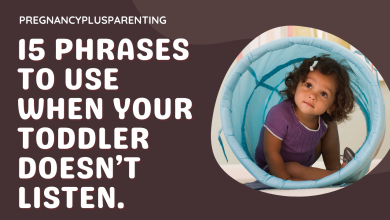Raising Amazing Kids? These 7 Mom Skills Are Key!
Do you want to be a good mother ? Discover the 7 positive parenting skills that are crucial for raising a well-rounded, happy child.
Parenting skills
We have all questioned our parenting skills in one way or another.
Maybe it was when your toddler was so upset that they refused to get up from the ground and finally leave the park, or they didn’t want to eat dinner but instead threw a fit.
It feels like you’re just yelling at your kids because that’s the only thing that seems to work.
The worst part is when they finally fall asleep after a long, tiring day and you’re full of regret, wishing you could wake them up and apologize.
All of this, on top of managing your household, running errands, and scheduling appointments… no wonder you’re exhausted from it all.
And if you’re like most moms, you start to question your ability to handle everything. You don’t want to be a “mean mom,” but sometimes it feels like one.

7 parenting skills that are really helpful
I have found that there are seven basic parenting skills that help us overcome these challenges.
These are the skills that keep us calm, no matter how frustrating the moment may be. Practicing these parenting skills will reduce challenges because we know how to prevent them.
Because real change goes beyond tips and tricks, but changes who you are and how you are – not just your child – and how you behave in these situations.
Take a look at this list of seven parenting skills and adapt it to your own:
Show empathy
Undoubtedly, one of the best parenting skills you need to develop is the ability to show empathy towards your child.
If you can show him that you truly understand what he is feeling, you will connect with him in ways you never imagined.
Why is empathy so powerful? For one thing, they don’t feel compelled to “speak their mind” because they now know you understand the depth of their frustration (yes, even if it’s about a lost toy).
You’re also showing them the importance of showing empathy in the first place. This will help them in future scenarios where they have to imagine what it feels like to be in someone else’s shoes.
And perhaps most importantly, empathy encourages you to be more patient and calm.
The simple act of seeing the situation from their point of view reduces the likelihood that you will yell or lose your temper.
Sure, it may just be a lost toy, but you can absolutely relate to the feeling of losing something precious.

Setting boundaries
Come with me for a moment into the home of a typical family.
A little boy refuses to go to bed, claiming he is thirsty and wants a glass of water… and maybe a book… and without his mom nearby, he can’t sleep.
Meanwhile, Mom does everything she can to prevent a possible tantrum and gives in to his every request.
She is overtired, but doesn’t want to upset him by saying that she has other things to do than stay in his room until he falls asleep.
The problem is that this pattern continues night after night. Not only that, but he wakes up in the middle of the night and cries anyway when he realizes Mom is no longer lying next to him. The result?
An exhausted mother is up in the middle of the night and a little boy couldn’t sleep.
Regardless of what many parents think, children need and want boundaries. Despite the little boy’s pleas and demands, he feels safer and better when he knows what is and isn’t allowed.
He doesn’t want to hold the reins and would rather rest in the certainty of your consistency and firm boundaries.
“Because of the tantrum they just had? It scares them to feel that way. And if we give in and don’t stand up for ourselves, then that tantrum seems even scarier than ever. Because if even their parents can’t handle a tantrum, who can?”
Set clear boundaries based on your child’s interests rather than trying to please them or avoid tantrums.
As uncomfortable as it may feel to put your foot down and assert yourself, you would be doing him a disservice if you did otherwise.

Create distance
At some point in your life as a parent, you have probably yelled at your child in a seemingly natural reaction.
It had done something, you had told it to stop, it kept doing it, and no sensible conversation was getting through to it.
So you screamed.
Trust me, you’re definitely not alone. We’ve all not only yelled at our children, but we’ve also taken their behavior so personally.
Maybe it was the time they deliberately disobeyed you, complete with a grin on their face. Or when they simply ignored you as if you hadn’t said anything at all.
We take their words and actions so personally that we feel addressed.
But reacting and personalizing their behavior means we bring so much of ourselves into the situation that we can’t think clearly.
Simply taking a break right after your child’s defiant behavior may be all you need to get some distance to stay calm.
You also realize that it’s not about you. That you don’t have to let other people’s behavior—including your child’s—determine how you feel. You’re almost “above it,” watching as an observer, rather than directly immersed in the situation.
In other words, your child can refuse to listen and say what they want, but you don’t let it get under your skin.
Don’t let it define who you are or drive you to react. You won’t be sucked into the downward spiral and instead, you’ll float above.

Search for the positive
The best way to deal with power struggles is to avoid them in the first place.
This can happen when we look for the positive instead of dwelling on all the things our children aren’t doing.
Yes, we need to discipline, but it’s not always easy to convince two children fighting over the same toy to learn the value of taking turns.
But recognize the times when they alternate, and you have a unique opportunity to reinforce positive behavior.
Look, it’s much easier to encourage a behavior you want to see by praising it when it happens than it is to correct your children when they do the opposite.
Not only that, but looking for the positive changes your mindset. Our brains like to be right, and when we focus on wrongdoing, we’re more likely to recognize the times when they prove us right.
This just puts us in a terrible cycle: We focus on the negative, we see the negative, and the negative proves us right. But if you look for the positive things your child does, you’ll be more likely to find and praise those times.

Communicate respectfully
We’ve all given our children that “tone” that says, “Because I said so” (without actually having to say those infamous words).
It is another example of this reaction when we cling to the authority we still have and try to exercise it in front of them.
Unfortunately, this power isn’t sustainable. In fact, it can actually damage the strong relationship every parent desires with their child.
Aside from these last-ditch efforts, what can we do instead? We can communicate firmly and respectfully.
We can ask ourselves if we would speak this way to others, including our spouses or colleagues, and get away with it (I suspect not).
Because when you speak with respect, you can almost see your child’s defenses melt away. They feel less attacked, their walls crumble as they realize they don’t have to prepare for another fight.
And it’s more likely that it will actually listen than if you had simply commanded it to do something.
All from a simple change in the way you speak.
Model the behavior
Easier said than done, as the saying goes, especially when it comes to actually modeling the behavior we want to see in our children.
Because what we say is only as effective as what we do. You can tell your child to be nice to his little brother all day, but if you yell and snap at others, you’ll see the same behavior in him.
This is where parenthood truly changes us, when it requires us to grow—and mature—alongside our children.
When it is not enough to tell them one thing, while we ourselves do not do the same, even when we know we have to.
Learn the importance of modeling the behavior you want to see in your child.
Show unconditional love
The phrase “unconditional love” is a bit ironic because true love is always unconditional.
But think of the many times we have imposed conditions on our children, such as withholding affection or making them feel guilty.
Unconditional love means reassuring your child that you love them no matter what, even if they throw a tantrum. You won’t love all of their behaviors or decisions, but you love them nonetheless.
This doesn’t mean you’re neglectful. You can, and in fact, should, continue to be loving even as you set boundaries and correct her behavior.
It’s discipline with the ultimate goal of helping them—not because you’re tired and frustrated.
And ultimately, unconditional love means they don’t have to do anything to earn or receive your love. It’s their birthright, simply for existing in your life. That’s unconditional love.
Conclusion
We can all improve our parenting skills, and that’s exactly what these moments with our children offer us – no matter how challenging they may be.
Every tantrum, every whining, or every power struggle not only helps our children grow, but also us.
It starts with setting boundaries so your child can safely explore their limits. You should also take some time off by taking a break or keeping a slight distance so you don’t take it so personally.
Try to see the positive, which will allow you to notice more of them, not just the negative.
Communicate with respect and empathy to melt their defenses and better connect with them. Model the behavior you want to see, which is far more effective than anything you say.
Finally, show unconditional love, knowing that what it is in its essence transcends any behavior or challenge it may present.
These parenting skills will help you in many ways if understood as a lifelong mission for improvement and growth.
Start by convincing your toddler to finally stop the tantrum and leave the park.






